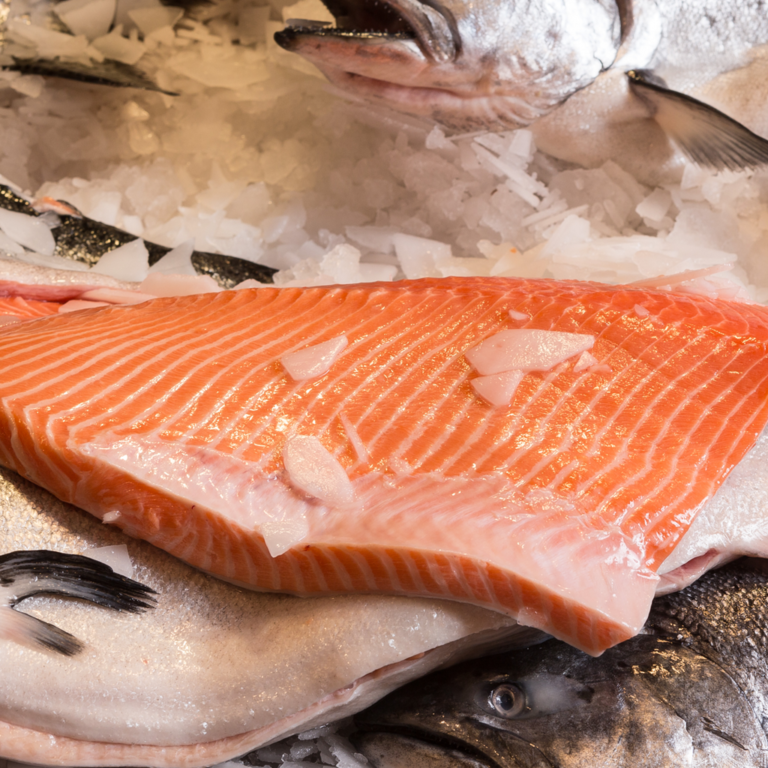Tips For Trout Fishing in New Jersey: Expert Strategies Revealed
Trout fishing in New Jersey is a popular pastime for many. Anglers seek the thrill of catching these beautiful fish in the state’s rivers and lakes.
Are you interested in improving your trout fishing skills? New Jersey offers many opportunities for both beginners and seasoned anglers. The state’s diverse waters are home to various trout species, making it an ideal destination. Whether you’re fishing in a tranquil stream or a bustling river, there are tips to help you succeed.
Understanding the best times to fish, the right gear to use, and the ideal techniques can make a big difference. Ready to enhance your trout fishing experience? Let’s dive into some practical tips for a successful fishing trip in New Jersey.

Credit: www.reddit.com
Top Trout Fishing Spots
New Jersey offers some of the best trout fishing spots in the Northeast. Anglers can find both rivers and lakes teeming with trout. Whether you are an experienced fisherman or a beginner, these locations provide excellent opportunities for a successful fishing trip. Let’s dive into the top trout fishing spots in New Jersey.
Best Rivers
The South Branch of the Raritan River is a favorite among anglers. It stretches across beautiful landscapes and offers ample fishing spots. The river is stocked regularly, ensuring a good catch.
The Musconetcong River is another top choice. It runs through Warren and Hunterdon counties. This river is known for its clear water and healthy trout population.
Pequannock River is ideal for those seeking a quieter experience. It flows through northern New Jersey and provides peaceful fishing settings.
Lakes To Explore
Lake Hopatcong is the largest lake in New Jersey. It is famous for its abundant trout. The lake is accessible and offers many spots for shore and boat fishing.
Round Valley Reservoir is a deep, clear lake. It is known for its trophy-sized trout. Anglers often catch large trout here, making it a popular destination.
Monksville Reservoir is another must-visit. It is stocked with trout and offers beautiful scenery. The reservoir also supports a variety of other fish species.
Essential Gear
When preparing for a successful trout fishing trip in New Jersey, having the right gear is essential. The right tools make the difference between a good day and a great day. Let’s discuss the essential gear you’ll need for trout fishing, focusing on fishing rods and bait and lures.
Fishing Rods
A good fishing rod is crucial for trout fishing. Choose a rod that is light and flexible. This helps you feel even the smallest nibbles. The rod length should be around 6 to 7 feet. This length offers the perfect balance of control and casting distance. Consider a spinning rod for its versatility and ease of use.
Here are some popular options:
- Ultra-Light Spinning Rod: Ideal for smaller trout.
- Medium-Light Spinning Rod: Suitable for larger trout.
Bait And Lures
Choosing the right bait and lures can significantly impact your fishing success. Live bait is often the best choice. Worms, minnows, and insects are great options. They attract trout naturally.
Lures can also be effective. They mimic the movements of natural prey. Here are some effective lures:
- Spinners: Great for clear water conditions.
- Spoons: Effective in deeper waters.
- Jigs: Versatile and can be used in various conditions.
Experiment with different colors and sizes. This helps you find what works best on a given day. Remember, trout can be picky!
Seasonal Tips
Fishing for trout in New Jersey can be a rewarding experience. Each season brings unique challenges and opportunities. This section will offer tips to improve your success rate throughout the year.
Spring Strategies
Spring is an excellent time for trout fishing. The water is warming up and trout are more active. Follow these tips for a successful spring fishing trip:
- Use Live Bait: Worms and minnows work best in spring.
- Fish in Shallow Waters: Trout often swim close to the surface.
- Early Morning or Late Afternoon: These times are the most productive.
- Bright Lures: Use bright colors to attract trout in murky waters.
Winter Techniques
Winter trout fishing requires different strategies. Trout are less active in cold water, but they can still be caught. Here are some winter tips:
- Slow and Steady: Move your bait slowly to entice sluggish trout.
- Deeper Waters: Trout often stay in deeper, warmer waters.
- Use Smaller Lures: Smaller lures mimic the limited food supply.
- Midday Fishing: Fish during the warmest part of the day.
Adapting your techniques to the season can make a big difference. Follow these tips to improve your chances of catching trout in New Jersey throughout the year.
Understanding Trout Behavior
Understanding trout behavior can enhance your fishing experience in New Jersey. Knowing how trout act helps in catching more fish. Trout have specific habits and patterns. This section provides insights into their feeding and habitat preferences.
Feeding Patterns
Trout feed actively during dawn and dusk. During these times, they find food easily. Insects, small fish, and crustaceans make up their diet. Match your bait with these food sources. Trout also change their feeding depth with the seasons. In summer, they feed in deeper, cooler waters. In spring and fall, they stay in shallower areas.
Habitat Preferences
Trout prefer clean, cold, and oxygen-rich waters. Streams and rivers with a steady flow are ideal. They stay near underwater structures like rocks and logs. These spots offer cover and food. Look for them in shaded areas during sunny days. In winter, they seek deeper pools where the water is warmer. Understanding these preferences helps you find them faster.
Fishing Techniques
Trout fishing in New Jersey can be an exciting adventure. Knowing the right techniques can make all the difference. Here are some effective methods to help you catch more trout.
Fly Fishing
Fly fishing is a popular method for trout fishing. It involves using a lightweight lure called a fly. The fly mimics the trout’s natural food. This technique requires a special rod and reel. Cast the fly gently onto the water. Let it drift naturally. The goal is to trick the trout into thinking the fly is real food.
Fly fishing is best in clear streams. Trout are more likely to see the fly. Practice your casting to improve accuracy. Pay attention to the water conditions. Trout are more active in cooler water. Early morning and late evening are the best times to fish. Patience is key in fly fishing. Wait for the trout to take the bait.
Spin Fishing
Spin fishing is another effective technique. It uses a spinning rod and reel. This method is easier for beginners. Use lures like spinners, spoons, and soft plastics. Cast your lure into the water. Retrieve it slowly. Vary the speed to attract trout.
Spin fishing works well in both rivers and lakes. Look for areas with underwater structures. Trout often hide near rocks and fallen trees. Use light fishing line for better sensitivity. This helps you feel when a trout bites. Keep your rod tip up. This helps prevent snags on the bottom.
Change your lures if you are not getting bites. Trout can be picky eaters. Experiment with different colors and sizes. Spin fishing can be very rewarding. It allows you to cover more water. This increases your chances of catching trout.

Credit: www.reddit.com
Local Regulations
When planning a trout fishing trip in New Jersey, it’s important to know the local regulations. These rules help protect fish populations and ensure a fair experience for all anglers. Understanding the licensing requirements and catch limits can make your fishing trip successful and enjoyable.
Licensing Requirements
In New Jersey, you need a fishing license to fish for trout. Anglers aged 16 and over must have a valid license. You can buy a license online or from authorized vendors. Prices vary based on age, residency, and duration. Always carry your license when fishing. Wardens may ask to see it.
Catch Limits
New Jersey has specific rules for trout catch limits. These rules ensure sustainable fishing. The daily limit is four trout per person. During certain times and in specific areas, limits may change. Always check the current regulations for the area you plan to fish. This helps protect fish populations and keeps fishing enjoyable for everyone.
Safety Tips
Trout fishing in New Jersey can be an enjoyable experience. However, safety must always come first. Understanding the local environment, weather, and wildlife is crucial. Here are some key safety tips to keep in mind during your fishing adventures.
Weather Precautions
Check the weather forecast before heading out. Sudden weather changes can be dangerous. Wear appropriate clothing to stay dry and warm. Always have a rain jacket in your gear. Thunderstorms can pose significant risks. If you hear thunder, seek shelter immediately. Avoid fishing during heavy rain or lightning. Wet rocks and banks become slippery and hazardous.
Wildlife Awareness
New Jersey is home to diverse wildlife. Some animals can be dangerous. Stay alert and observe your surroundings. Do not approach or feed wild animals. They can be unpredictable. Carry a whistle or air horn to scare off aggressive animals. Be mindful of snakes near water bodies. Wear boots and long pants to protect yourself. Keep a safe distance from nests and dens.
Conservation Practices
Trout fishing in New Jersey is a beloved activity. To keep the waters healthy and the fish populations stable, anglers must follow conservation practices. These practices not only ensure the future of trout fishing but also protect the environment.
Catch And Release
Catch and release is a popular conservation method. It allows anglers to enjoy fishing while preserving fish populations. Here are some key tips for effective catch and release:
- Use barbless hooks to minimize injury.
- Handle the fish as little as possible.
- Wet your hands before touching the fish.
- Release the fish quickly back into the water.
Following these steps helps the fish survive and thrive. Respect for the fish and their habitat ensures a sustainable fishing experience.
Sustainable Fishing
Sustainable fishing practices are crucial for maintaining healthy ecosystems. These methods help reduce the impact on fish populations and their environment. Here are some sustainable fishing tips:
- Know and follow local fishing regulations.
- Avoid fishing during spawning seasons.
- Use artificial lures instead of live bait.
- Do not overfish an area.
By practicing sustainable fishing, anglers contribute to the long-term health of trout populations. This ensures that future generations can enjoy fishing in New Jersey.

Credit: fishingbooker.com
Frequently Asked Questions
What Is The Best Time For Trout Fishing In Nj?
The best time for trout fishing in New Jersey is during early spring and fall. During these seasons, trout are most active. Early morning and late afternoon are ideal times.
Where Can I Find Trout In New Jersey?
Trout can be found in New Jersey’s streams, rivers, and lakes. Popular spots include the Ken Lockwood Gorge, Pequest River, and Round Valley Reservoir.
What Bait Is Best For Trout Fishing?
Live bait like worms and minnows are effective for trout fishing. Artificial lures such as spinners and flies also work well.
Do I Need A Fishing License In Nj?
Yes, you need a fishing license to fish for trout in New Jersey. You can purchase it online or at local retailers.
Conclusion
Trout fishing in New Jersey offers a rewarding experience for all. Follow these tips for a successful trip. Remember to check local regulations and bring the right gear. Be patient and enjoy the beautiful surroundings. Practice catch and release to help preserve the fish population.
Respect nature and fellow anglers. With practice, you’ll improve your skills and enjoy many memorable fishing trips in New Jersey. Happy fishing!



